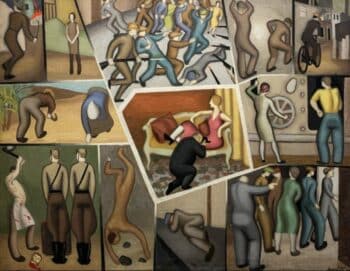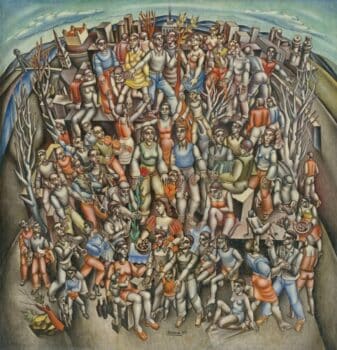Dear friends,
New Year greetings from the desk of Tricontinental: Institute for Social Research.

Marcelo Pogolotti (Cuba), Siglo XX o Regalo a la querida (‘20th century or Gift for the loved one’), 1933.
In May 2021, the executive director of UN Women, Phumzile Mlambo-Ngcuka, and the UN high representative for disarmament affairs, Izumi Nakamitsu, wrote an article urging governments to cut excessive military spending in favour of increasing spending on social and economic development. Their wise words were not heard at all. To cut money for war and to increase money for social development, they wrote, is ‘not a utopian ideal, but an achievable necessity’. That phrase—not a utopian ideal, but an achievable necessity—is essential. It describes the project of socialism almost perfectly.
Our institute has been at work for over five years, driven precisely by this idea that it is possible to transform the world to meet the needs of humanity while living within nature’s limits. We have accompanied social and political movements, listened to their theories, observed their work, and built our own understanding of the world based on these attempts to change it. This process has been illuminating. It has taught us that it is not enough to try and build a theory from older theories, but that it is necessary to engage with the world, to acknowledge that those who are trying to change the world are able to develop the shards of an assessment of the world, and that our task—as researchers of Tricontinental: Institute for Social Research—is to build those shards into a worldview. The worldview that we are developing does not merely understand the world as it is; it also takes hold of the dynamic that seeks to produce the world as it should be.
Our institute is committed to tracing the dynamics of social transcendence, and how we can get out of a world system that is driving us to annihilation and extinction. There are sufficient answers that exist in the world now, already present with us even when social transformation seems impossible. The total social wealth on the planet is extraordinary, although—due to the long history of colonialism and violence—this wealth is simply not used to generate solutions for common problems, but to aggrandise the fortunes of the few. There is enough food to feed every person on the planet, for instance, and yet billions of people remain hungry. There is no need to be naïve about this reality, nor is there a need to feel futile.

Renato Guttuso (Italy), May 1968, 1968.
In one of our earliest newsletters, which brought our first year of work (2018) to a close, we wrote that ‘it is easier to imagine the end of the earth than to imagine the end of capitalism, to imagine the polar ice cap flooding us into extinction than to imagine a world where our productive capacity enriches all of us’. This remains true. And yet, despite this, there is ‘a possible future that is built to meet people’s aspirations… It is cruel to think of these hopes as naïve’.
The problems we face are not for lack of resources or lack of technological and scientific knowhow. At Tricontinental: Institute for Social Research, we believe that it is because of the social system of capitalism that we are unable to transcend our common problems. This system constrains the forward movement that requires the democratisation of nations and the democratisation of social wealth. There are hundreds of millions of people organised into political and social formations that are pushing against the gated communities in our world, fighting to break down the barriers and build the utopias that we require to survive. But, rather than recognise that these formations seek to realise genuine democracy, they are criminalised, their leaders arrested and assassinated, and their own precious social confidence vanquished. Much the same repressive behaviour is meted out to national projects that are rooted in such political and social movements, projects that are committed to using social wealth for the greatest good. Coups, assassinations, and sanctions regimes are routine, their frequency illustrated by an unending sequence of events, from the coup in Peru in December 2022 to the ongoing blockade of Cuba, and by the denial that such violence is used to block social progress.
Our institute is committed to tracing the dynamics of social transcendence, and how we can get out of a world system that is driving us to annihilation and extinction. There are sufficient answers that exist in the world now, already present with us even when social transformation seems impossible. The total social wealth on the planet is extraordinary, although—due to the long history of colonialism and violence—this wealth is simply not used to generate solutions for common problems, but to aggrandise the fortunes of the few. There is enough food to feed every person on the planet, for instance, and yet billions of people remain hungry. There is no need to be naïve about this reality, nor is there a need to feel futile.

Milan Chovanec (Czechoslovakia), Peace, 1978.
In one of our earliest newsletters, which brought our first year of work (2018) to a close, we wrote that ‘it is easier to imagine the end of the earth than to imagine the end of capitalism, to imagine the polar ice cap flooding us into extinction than to imagine a world where our productive capacity enriches all of us’. This remains true. And yet, despite this, there is ‘a possible future that is built to meet people’s aspirations… It is cruel to think of these hopes as naïve’.
The problems we face are not for lack of resources or lack of technological and scientific knowhow. At Tricontinental: Institute for Social Research, we believe that it is because of the social system of capitalism that we are unable to transcend our common problems. This system constrains the forward movement that requires the democratisation of nations and the democratisation of social wealth. There are hundreds of millions of people organised into political and social formations that are pushing against the gated communities in our world, fighting to break down the barriers and build the utopias that we require to survive. But, rather than recognise that these formations seek to realise genuine democracy, they are criminalised, their leaders arrested and assassinated, and their own precious social confidence vanquished. Much the same repressive behaviour is meted out to national projects that are rooted in such political and social movements, projects that are committed to using social wealth for the greatest good. Coups, assassinations, and sanctions regimes are routine, their frequency illustrated by an unending sequence of events, from the coup in Peru in December 2022 to the ongoing blockade of Cuba, and by the denial that such violence is used to block social progress.
As we begin the new year, I would like to express my gratitude to everyone who works at Tricontinental: Institute for Social Research, a team that is spread across the globe, from Buenos Aires to Shanghai, from Trivandrum to Rabat. If you would like to assist our work, please remember that we welcome donations.
We urge you to share our materials as widely as possible, to study them in your movements, and to invite members of our team to speak about our work.
Warmly,
Vijay

